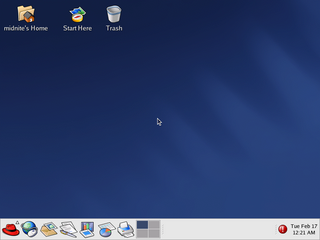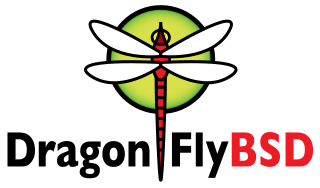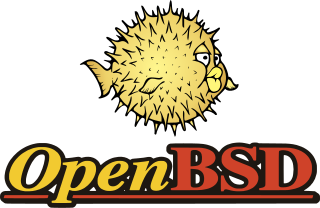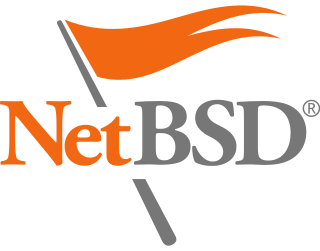
The GNU Compiler Collection (GCC) is a collection of compilers from the GNU Project that support various programming languages, hardware architectures and operating systems. The Free Software Foundation (FSF) distributes GCC as free software under the GNU General Public License. GCC is a key component of the GNU toolchain which is used for most projects related to GNU and the Linux kernel. With roughly 15 million lines of code in 2019, GCC is one of the largest free programs in existence. It has played an important role in the growth of free software, as both a tool and an example.

Red Hat Linux was a widely used commercial open-source Linux distribution created by Red Hat until its discontinuation in 2004.

DragonFly BSD is a free and open-source Unix-like operating system forked from FreeBSD 4.8. Matthew Dillon, an Amiga developer in the late 1980s and early 1990s and FreeBSD developer between 1994 and 2003, began working on DragonFly BSD in June 2003 and announced it on the FreeBSD mailing lists on 16 July 2003.

MirOS BSD is a free and open source operating system which started as a fork of OpenBSD 3.1 in August 2002. It was intended to maintain the security of OpenBSD with better support for European localisation. Since then it has also incorporated code from other free BSD descendants, including NetBSD, MicroBSD and FreeBSD. Code from MirOS BSD was also incorporated into ekkoBSD, and when ekkoBSD ceased to exist, artwork, code and developers ended up working on MirOS BSD for a while.

DTrace is a comprehensive dynamic tracing framework originally created by Sun Microsystems for troubleshooting kernel and application problems on production systems in real time. Originally developed for Solaris, it has since been released under the free Common Development and Distribution License (CDDL) in OpenSolaris and its descendant illumos, and has been ported to several other Unix-like systems.

Code::Blocks is a free, open-source, cross-platform IDE that supports multiple compilers including GCC, Clang and Visual C++. It is developed in C++ using wxWidgets as the GUI toolkit. Using a plugin architecture, its capabilities and features are defined by the provided plugins. Currently, Code::Blocks is oriented towards C, C++, and Fortran. It has a custom build system and optional Make support.
The OpenBSD operating system focuses on security and the development of security features. According to author Michael W. Lucas, OpenBSD "is widely regarded as the most secure operating system available anywhere, under any licensing terms."
These tables compare free software / open-source operating systems. Where not all of the versions support a feature, the first version which supports it is listed.
In the context of free and open-source software, proprietary software only available as a binary executable is referred to as a blob or binary blob. The term usually refers to a device driver module loaded into the kernel of an open-source operating system, and is sometimes also applied to code running outside the kernel, such as system firmware images, microcode updates, or userland programs. The term blob was first used in database management systems to describe a collection of binary data stored as a single entity.
The Portable C Compiler is an early compiler for the C programming language written by Stephen C. Johnson of Bell Labs in the mid-1970s, based in part on ideas proposed by Alan Snyder in 1973, and "distributed as the C compiler by Bell Labs... with the blessing of Dennis Ritchie."

Linux is a family of open-source Unix-like operating systems based on the Linux kernel, an operating system kernel first released on September 17, 1991, by Linus Torvalds. Linux is typically packaged as a Linux distribution (distro), which includes the kernel and supporting system software and libraries, many of which are provided by the GNU Project.

FreeBSD is a free and open-source Unix-like operating system descended from the Berkeley Software Distribution (BSD). The first version of FreeBSD was released in 1993 developed from 386BSD and the current version runs on IA-32, x86-64, ARM, PowerPC and RISC-V processors. The project is supported and promoted by the FreeBSD Foundation.
GNU variants are operating systems based upon the GNU operating system. According to the GNU project and others, these also include most operating systems using the Linux kernel and a few others using BSD-based kernels.
Clang is a compiler front end for the programming languages C, C++, Objective-C, Objective-C++, and the software frameworks OpenMP, OpenCL, RenderScript, CUDA, SYCL, and HIP. It acts as a drop-in replacement for the GNU Compiler Collection (GCC), supporting most of its compiling flags and unofficial language extensions. It includes a static analyzer, and several code analysis tools.

OpenBSD is a security-focused, free and open-source, Unix-like operating system based on the Berkeley Software Distribution (BSD). Theo de Raadt created OpenBSD in 1995 by forking NetBSD 1.0. The OpenBSD project emphasizes portability, standardization, correctness, proactive security, and integrated cryptography.

NetBSD is a free and open-source Unix-like operating system based on the Berkeley Software Distribution (BSD). It was the first open-source BSD descendant officially released after 386BSD was forked. It continues to be actively developed and is available for many platforms, including servers, desktops, handheld devices, and embedded systems.
Bionic is an implementation of the C standard library, developed by Google for its Android operating system. It differs from the GNU C Library (glibc) in being designed for devices with less memory and processor power than a typical Linux system. It is a combination of new code and code from FreeBSD, NetBSD, and OpenBSD released under a BSD license, rather than glibc, which uses the GNU Lesser General Public License. This difference was important in the early days of Android, when static linking was common, and since Bionic has its own application binary interface, it cannot be replaced by a different libc without breaking all existing apps.

OpenZFS is an open-source implementation of the ZFS file system and volume manager initially developed by Sun Microsystems for the Solaris operating system, and is now maintained by the OpenZFS Project. Similar to the original ZFS, the implementation supports features like data compression, data deduplication, copy-on-write clones, snapshots, RAID-Z, and virtual devices that can create filesystems that span multiple disks.










